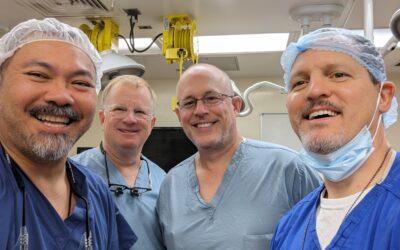Often, Dr. Tim Tollestrup takes time to answer questions commonly asked by patients. In this post, he discusses when it may be the right time to have nerve surgery:
One of the questions I’m most asked is this: “If I have peripheral neuropathy, when is the right time to have peripheral nerve surgery?”
This is a question that is best answered by the patient. It comes down to a quality of life choice.
First, a quick review. What is peripheral neuropathy? Peripheral Neuropathy is pain or sensory loss or muscle weakness, usually in the extremities – hands, feet or both. If you’re a diabetic, it’s called diabetic neuropathy. Everyone else is lumped into a category labeled “idiopathic neuropathy.” “Idiopathic” is a fancy word which really means “we have no idea what the cause is.”
Common risk factors associated with developing peripheral neuropathy include diabetes, hypothyroidism, prior chemotherapy treatment, or long term oral prednisone use. Keep in mind though that the vast majority of patients and people I see do not have any of these risk factors.
Deciding to move forward with peripheral nerve surgery comes down to a simple personal choice. The tipping point is really when the reward of surgery – a pain-free life and resuming normal activities – outweighs the risks and inconveniences of surgery.
Some people choose to grin and bear the pain. Others try medications such as Gabapentin and Lyrica. The problem with these types of medications is that they are usually either completely ineffective or they may just “take the edge off” the pain. In addition many people experience unpleasant side effects which can be worse than the original neuropathy symptoms.
Certainly, peripheral neuropathy is never life-threatening. This is why it is such a personal, individual decision to either live with the pain or try surgery.
I never try to convince patients to have surgery unless they show signs of significant muscle weakness or wasting. Most patients with neuropathy have mild to moderate muscle weakness that is often subclinical. However, if the motor weakness is extreme, delaying surgery can have dire, negative consequences.
When muscle tissue is deprived of normal nerve stimulation for a prolonged period it results in permanent tissue damage. The window of opportunity to surgically correct the nerve problem and avoid permanent disability is approximately 12 months, but can be shorter or longer depending on the situation.
Surgery always involves some degree of discomfort and risk. Risks include risks associated with general anesthesia, infection, bleeding and surgical recovery and healing.
Bottom line – most of the time when patients contact me they have exhausted all other non-surgical options and are at the end of the line. I am their last hope for quality of life. The basic concept behind peripheral nerve surgery for patient’s with peripheral neuropathy is that the nerves are compressed or pinched and surgery simply relieves the pressure on the nerves. Conceptually, this is no different than the type of surgery that is done for someone suffering from carpal tunnel syndrome. Only patients who demonstrate signs of nerve compression on physical examination are candidates for surgery.
The success rate of surgery for patients suffering from peripheral neuropathy is upwards of 80% . For patients who respond to the surgery, the relief is usually complete and permanent. It is very rewarding to be able to take patients who are suffering from the numbness and pain associated with peripheral neuropathy and restore them to an active, pain-free life again.
If you’re interested, here is the story of April, a patient of mine who suffered from peripheral neuropathy.
- Tim Tollestrup MD
If you or someone you love suffers from peripheral neuropathy, Dr. Tollestrup can help. Fill out a form on the right to schedule your consultation.

